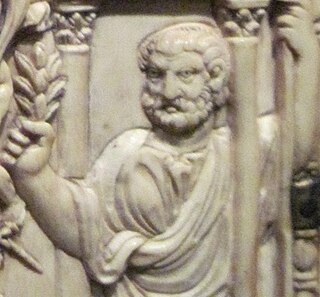Related Research Articles

Quintus Aurelius Symmachus signo Eusebius was a Roman statesman, orator, and man of letters. He held the offices of governor of proconsular Africa in 373, urban prefect of Rome in 384 and 385, and consul in 391. Symmachus sought to preserve the traditional religions of Rome at a time when the aristocracy was converting to Christianity, and led an unsuccessful delegation of protest against Emperor Gratian's order to remove the Altar of Victory from the curia, the principal meeting place of the Roman Senate in the Forum Romanum. Two years later he made a famous appeal to Gratian's successor, Valentinian II, in a dispatch that was rebutted by Ambrose, the bishop of Milan. Symmachus's career was temporarily derailed when he supported the short-lived usurper Magnus Maximus, but he was rehabilitated and three years later appointed consul. After the death of Theodosius I, he became an ally of Stilicho, the guardian of emperor Honorius. In collaboration with Stilicho he was able to restore some of the legislative powers of the Senate. Much of his writing has survived: nine books of letters; a collection of Relationes or official dispatches; and fragments of various orations.

The gens Aurelia was a plebeian family at ancient Rome, which flourished from the third century BC to the latest period of the Empire. The first of the Aurelian gens to obtain the consulship was Gaius Aurelius Cotta in 252 BC. From then to the end of the Republic, the Aurelii supplied many distinguished statesmen, before entering a period of relative obscurity under the early emperors. In the latter part of the first century, a family of the Aurelii rose to prominence, obtaining patrician status, and eventually the throne itself. A series of emperors belonged to this family, through birth or adoption, including Marcus Aurelius and the members of the Severan dynasty.
Lucius Marius Maximus Perpetuus Aurelianus was a Roman biographer, writing in Latin, who in the early decades of the 3rd century AD wrote a series of biographies of twelve Emperors, imitating and continuing Suetonius. Marius's work is lost, but it was still being read in the late 4th century and was used as a source by writers of that era, notably the author of the Historia Augusta. The nature and reliability of Marius's work, and the extent to which the earlier part of the HA draws upon it, are two vexed questions among the many problems that the HA continues to pose for students of Roman history and literature.

The praefectus annonae, also called the praefectus rei frumentariae was a Roman official charged with the supervision of the grain supply to the city of Rome. Under the Republic, the job was usually done by an aedile. However, in emergencies, or in times of extraordinary scarcity, someone would be elected to the office, and would take charge of supplying the entire city with provisions.
Quintus Clodius Hermogenianus Olybrius was a Roman politician, praefectus urbi of Rome from 368 to 370 and Roman consul in 379. Olybrius has been characterized as belonging to "the breed of flexible politicians who did well both under Valentinian I [...] and under Gratian."
Vettius Agorius Praetextatus was a wealthy pagan aristocrat in the 4th-century Roman Empire, and a high priest in the cults of numerous gods. He served as the praetorian prefect at the court of Emperor Valentinian II in 384 until his death that same year.
Virius Nicomachus Flavianus was a grammarian, a historian and a politician of the Roman Empire.
Nicomachus Flavianus, sometimes referred to as Flavianus the Younger, was a grammarian and a politician of the Roman Empire. He was the son of Virius Nicomachus Flavianus. He held several offices under emperors Valentinian II (371–392), Theodosius I (379–395), Honorius (393–423), and Valentinian III (425–455); together with his father he supported the usurper Eugenius until his defeat and death (392–394). Flavianus also edited a corrected version of Livy's work.
Appius Nicomachus Dexter was a politician of the Western Roman Empire.

Quintus Fabius Memmius Symmachus was a politician of the Roman empire, member of the influential family of the Symmachi.
The Aurelii Symmachi were an aristocratic senatorial family (gens) of the late Roman Empire.
Aurelius Valerius Symmachus Tullianus was a Roman senator and aristocrat. He was appointed consul in 330 by the emperor Constantine.
Lucius Aurelius Avianius SymmachussignoPhosphorius was an aristocrat of the Roman Empire, and father of Quintus Aurelius Symmachus.
Aurelius Celsinus was a politician of the Roman Empire.
Maximus was a Roman politician.